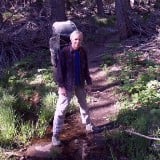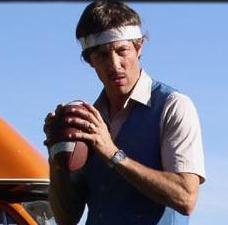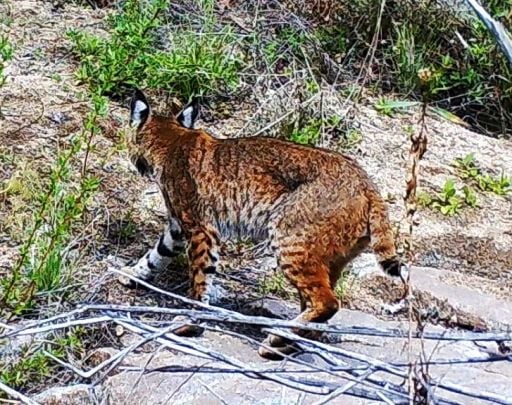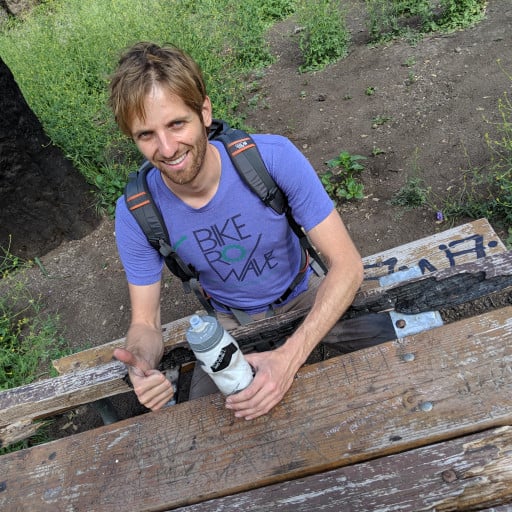Hikers Rescued 4 Days After Disappearing in Mount Baldy Area (Desplinter & Wallace)
-
jfr

- Posts: 154
- Joined: Sat Dec 12, 2009 3:01 pm
-
Uncle Rico

- Posts: 1481
- Joined: Thu Mar 20, 2008 7:48 pm
Is there still snow obscuring the route to Cucamonga from Ice House Saddle? Trying to figure out how two experienced hikers ended up in Cucamonga Canyon because the route is otherwise pretty obvious. Unless they deliberately dropped into Cucamonga Canyon and then couldn't climb back out.
-
HikeUp

- Posts: 4036
- Joined: Thu Sep 27, 2007 9:21 pm
"lost the trail, had a slip while going to Cucamonga Peak and decided to descend through a valley that was more treacherous than they had anticipated. "
from
https://abc13.com/rescue-crews-find-mis ... s/5243177/
from
https://abc13.com/rescue-crews-find-mis ... s/5243177/
-
David R
- OG of the SG
- Posts: 627
- Joined: Sun Jun 12, 2011 10:28 pm
Canyons are very enticing when people are trying to get down and lost. Then the thought of going back up is too daunting or they get too weak when they hit an obstacle or worse they try to continue and get seriously injured or killed. Almost every story of a lost hiker locally that I hear about ends up in a canyon and getting stopped. I'm surprised that they didn't look in this canyon much earlier as it is a perfect place to get stuck.
-
headsizeburrito

- Posts: 279
- Joined: Wed Nov 15, 2017 1:18 pm
Yep, here is my exploration of that canyon for those that haven't seen it:
upper-cucamonga-canyon-exploration-trip ... t7692.html
They are lucky they stopped when they did, if they had kept going down they might not have survived.
Good news and good work by all the rescuers. Hopefully we'll get more info on exactly what happened and how far down the canyon they were found.
upper-cucamonga-canyon-exploration-trip ... t7692.html
They are lucky they stopped when they did, if they had kept going down they might not have survived.
Good news and good work by all the rescuers. Hopefully we'll get more info on exactly what happened and how far down the canyon they were found.
-
hikeandhike
- Posts: 46
- Joined: Mon Sep 09, 2013 7:20 pm
Video of the rescue here:
https://fox5sandiego.com/2019/04/12/mt- ... ly-5-days/
Says they were trapped between two waterfalls
https://fox5sandiego.com/2019/04/12/mt- ... ly-5-days/
Says they were trapped between two waterfalls
-
tekewin

- Posts: 1385
- Joined: Thu Apr 11, 2013 5:07 pm
Very glad they survived. I think they were experienced "on well groomed and signed trails". I can't imagine why they decided to descend that way even after slipping, unless they were lost and unable to figure out a way back up. The most likely place to slip would be on the steep switchback section, but that is not above the canyon. Maybe they missed a switchback and contoured around to the south side Cucamonga and slipped there. Again, pure wild speculation.
-
Sean

- Cucamonga
- Posts: 4249
- Joined: Wed Jul 27, 2011 12:32 pm
I give them points for surviving that long. Lots of things can go wrong over there. But, yeah, generally you don't want to descend an unknown canyon.
-
hikeandhike
- Posts: 46
- Joined: Mon Sep 09, 2013 7:20 pm
There's another article up that talks about them using their jackets as makeshift ropes to descend multiple waterfalls. They also "slid" down one waterfall, getting wet in the process (that might have been deadly).
Per the article:
They tried signalling a helicopter earlier on, and it looked like he saw them, but then no luck.
They left several articles of clothing ties in old ropes along some of the waterfalls ---supposedly still back there. An inclined canyoneerer might go back to find it, would be interesting to see.
Per the article:
They tried signalling a helicopter earlier on, and it looked like he saw them, but then no luck.
They left several articles of clothing ties in old ropes along some of the waterfalls ---supposedly still back there. An inclined canyoneerer might go back to find it, would be interesting to see.
-
headsizeburrito

- Posts: 279
- Joined: Wed Nov 15, 2017 1:18 pm
Got a link to that article?
Sounds like they are lucky that getting wet and sacrificing clothing didn't kill them via hypothermia.
As Sean said, descending an unknown canyon is generally a bad idea.
Sounds like they are lucky that getting wet and sacrificing clothing didn't kill them via hypothermia.
As Sean said, descending an unknown canyon is generally a bad idea.
-
jfr

- Posts: 154
- Joined: Sat Dec 12, 2009 3:01 pm
Just read a fairly complete article on yahoo news (that said it was from USA Today)
https://news.yahoo.com/apos-down-apos-g ... 41974.html
https://news.yahoo.com/apos-down-apos-g ... 41974.html
My hiking trip reports: https://hikingtales.com/
-
dima

- Posts: 1735
- Joined: Wed Feb 12, 2014 1:35 am
- Location: Los Angeles
Thanks for posting that. This is nuts. It's really not clear to me why they didn't try harder than they did to climb back up. I guess they tried on day 2, and got lost. But they then spent 3 full days NOT going to where they knew the trail was. I don't get it.
headsizeburrito: from the description (between a slide and a big waterfall) do you have a sense of where they ended up?
headsizeburrito: from the description (between a slide and a big waterfall) do you have a sense of where they ended up?
-
David R
- OG of the SG
- Posts: 627
- Joined: Sun Jun 12, 2011 10:28 pm
About 2hrs downstream of the S-bend (or 7hrs 30min from the start), the canyon deepens again and you enter the Upper Narrows, the most dramatic gorge in Cucamonga Canyon. With the steepening walls, you begin to anticipate larger and more precipitous waterfalls and, at about 4600ft, the first substantial
obstacle you encounter is a small, 15ft waterfall. This milestone is readily identifiable because you can climb down through a slot to the right of the falls. Shortly after this there is a slide that is negotiated using a log that runs through it. This is immediately followed, at an elevation of about 4500ft, by the largest waterfall of the adventure, the Upper Cucamonga Falls with a vertical drop of about 65ft to a large pool in a deep, flat-bottomed ravine.
They made it to the top of these falls.
 |
| Big falls in |
| Cucamonga Canyon |
They made it to the top of these falls.
-
Uncle Rico

- Posts: 1481
- Joined: Thu Mar 20, 2008 7:48 pm
Wow, they were quite deep into the canyon.
It's the old adage "better the devil you know than the devil that you don't."
The better play was struggling back to the saddle and the known trail to Ice House instead of dropping further into the unknown abyss (says Captain Obvious).
It's the old adage "better the devil you know than the devil that you don't."
The better play was struggling back to the saddle and the known trail to Ice House instead of dropping further into the unknown abyss (says Captain Obvious).
-
tekewin

- Posts: 1385
- Joined: Thu Apr 11, 2013 5:07 pm
Hmm. Do I climb 100' back up to the trail or start a 15 mile cross country descent into an unknown wild canyon that will leave me 40 miles from my car? Tough one.Uncle Rico wrote: Wow, they were quite deep into the canyon.
It's the old adage "better the devil you know than the devil that you don't."
The better play was struggling back to the saddle and the known trail to Ice House instead of dropping further into the unknown abyss (says Captain Obvious).
-
AW~

- Posts: 2092
- Joined: Mon Oct 01, 2007 12:00 pm
Yeah, this is his side of the story....even though he claims its all about her.tekewin wrote:
Hmm. Do I climb 100' back up to the trail or start a 15 mile cross country descent into an unknown wild canyon that will leave me 40 miles from my car? Tough one.
The fall on the mountain side started a panic that never went away. Yeti was somewhere on the snow. BTW, maybe there was a scrawled note that said " I am not SASSQUATCH!!! grrrr"
The canyon part and the quotation...."I remember him mentioning the movie ’127 Hours' ".
-
headsizeburrito

- Posts: 279
- Joined: Wed Nov 15, 2017 1:18 pm
??DeSplinter is grateful for the rescuers, but said he thinks they could have made it out safely on their own within a day or two.
I've got stuff to do, but now I'm all worked up about this guy and article...
David R - I think they got a little lower than Upper Cucamonga Falls and perhaps stopped at the next significant drop. I wouldn't put too much stock in the exact details as reported, but Day 5 in the article describes descending one section partially via old ropes, which would probably be those falls, then apparently stopping. There wouldn't be any old ropes before those upper falls, so they must have gotten below that point.
As everyone is saying, the obvious solution would have been to simply go back up and rejoin the trail instead of descending an unknown canyon. I agree with AW that this was probably a panic situation that created a compounding series of bad choices.
The article describes him as an experienced hiker with all the little bits gadgets from the survival shelf of the store (lifestraw, blanket, mirror, glow sticks), but doesn't make any mention of a map. He apparently checked a compass at one point, but then got lost because they were in a short bend in the canyon and got confused by the direction, rather than noticing the pretty obvious uphill/downhill and upstream/downstream. This kind of tunnel vision ('Get down or you're going to die' as he was quoted and the obvious navigation error after they made the bad choice to try and go down via the canyon) is pretty common after an initial error, which is why it is so important to stop and calm down for a few minutes after something like a fall. You don't want that first surge of panic and adrenaline to cause you to make other mistakes.
I think it is perhaps telling that there are no quotes from his hiking partner in the article... I'm also kind of pissed at the author that there are no quotes from experts explaining what they did wrong and what they should have done instead. Rather we get the dramatic hero story with quotes from him at the end like he knows what he is talking about, then saying he is going to go back and a dumb remark about bringing more snacks next time. If he does I hope some babysitters with proper gear go with him so he gets another look at some of those drops and realizes how lucky he is that neither of them were killed or seriously injured. And how obvious just going back up to the trail should have been.
-
spotfin
- Posts: 53
- Joined: Fri Jan 01, 2010 2:30 pm
I was in a similar situation a few years back. I hiked Hines Peak in Ventura and was planning to tag TopaTopa on the way back. Got into a full blown whiteout and somehow missed the big sign marking the turnoff and went way past. As I was running late, I looked at the map trying to figure out a shortcut. I Noticed a canyon that would/should eventually intersect with the trail. a bad decision made under pressure. Climbed down the canyon, first waterfall was about 10', no problem, 2nd waterfall was 15' and a bit difficult. I then came to a 30' waterfall and that gave me pause. If I fell, I would be totally screwed as there could be another, higher waterfall below and I would not be able to climb back up or down. I took a break and considered my options. I finally decided to climb back up and try to locate the trail. I knew this would delay me by several hours, but it was the only reasonable option. Long story short, I made it back up, found the trail and got home by midnight. BTW, this was in December and it started snowing on the way out. My wife was worried and pissed off and was just about to call the cavalry when I got home. I got a spot communicator the next day so I could alert her in case of delays and call search and rescue if needed.
Following this ordeal I did some research on the subject and found out that many canyons get steeper as you go lower and the waterfalls get higher. Good to know. I also read several articles about people getting trapped between waterfalls. It happened several times at Caramba on San Jacinto. Hikers see the tempting lights of Palm Springs below and think it is a shortcut only to get trapped between waterfalls. Several died in that location. Glad these hikers survived and didn't pay the ultimate price.
Following this ordeal I did some research on the subject and found out that many canyons get steeper as you go lower and the waterfalls get higher. Good to know. I also read several articles about people getting trapped between waterfalls. It happened several times at Caramba on San Jacinto. Hikers see the tempting lights of Palm Springs below and think it is a shortcut only to get trapped between waterfalls. Several died in that location. Glad these hikers survived and didn't pay the ultimate price.
-
headsizeburrito

- Posts: 279
- Joined: Wed Nov 15, 2017 1:18 pm
Yeah, if you read reports on lost hikers on peaks taking a "shortcut" down is often the cause of a lot of problems like getting cliffed out. I think many of us have made that mistake to some degree at some point, I know I have. Years back I did San Ysidro East in Anza Borrego by following a random ridge up, then taking a random canyon down. It got pretty sketchy and I learned a valuable lesson. It's better to stay on the ridges to descend and if you are in a canyon, make sure the walls aren't so step you can't bail that way before going down a drop you aren't sure you can't get back up if you need to. In that case it worked out, but I finished hours behind schedule, was pretty stressed out, and had no means of communication (I have since gotten an InReach).
I think part of what a lot of people (myself included) are mad about isn't just the mistake, but the denial of the mistake and the lack of humility.
It reminds me of this situation in Colorado a couple years ago, when several people died on one peak in just six weeks:
https://www.aspentimes.com/news/breakin ... itol-peak/
This quote stands out to me:
I think part of what a lot of people (myself included) are mad about isn't just the mistake, but the denial of the mistake and the lack of humility.
It reminds me of this situation in Colorado a couple years ago, when several people died on one peak in just six weeks:
https://www.aspentimes.com/news/breakin ... itol-peak/
This quote stands out to me:
If you are unfamiliar with the area, sticking to the standard route is always better than trying to find a shortcut, because as these two on Cucamonga found it, it probably isn't a shortcut.“If there was a safe shortcut, it would be the standard route.”
-
HikeUp

- Posts: 4036
- Joined: Thu Sep 27, 2007 9:21 pm
During my off-trail hikes I pretty much made this the #1 rule - "no shortcuts". My biggest "fear" (too harsh a word perhaps - maybe "worry" would be better) was cliffing out and having to double or triple my effort to go back up, run out of water, etc. Rule #1 corollary was never commit to a route that didn't have an out (i.e a way back up) in case it cliifed out. Never go up what you can't (i.e. you don't know how to) get back down from and never go down what you can't (i.e. you don't know how to) get back out of.headsizeburrito wrote: I think many of us have made that mistake to some degree at some point,
@AW~ taught me a lesson one day as we descended a random ridge from PCT towards Highway 2. I asked him why we were taking this particular long descent via ridge/slope instead of the more direct line of going straight down a drainage. He stood next to me and pointed down into the drainage at some rock outcrops and said "cliffs/waterfalls". He recognized/anticipated them from experience - he'd seen similar situations first hand before and knew I couldn't have descended them safely (although he could have most likely). Humbling experience that I'll never forget even though it was very low real risk. Knowledge.
-
Sean

- Cucamonga
- Posts: 4249
- Joined: Wed Jul 27, 2011 12:32 pm
In addition to hiking, I also take philosophy seriously. There is a famous painting by Raphael called "The School of Athens." It shows Plato and Aristotle talking to each other. Plato is pointing up at the sky. Aristotle is motioning downward at the Earth.
This picture symbolizes the two fundamental orientations for thinking. Either you focus on your imagination (have your head in the clouds) or you focus on your observation (be grounded in reality).
The moment the woman fell from the trail, it appears that the man went into full Platonic mode. He began imagining an epic survival adventure down an unknown canyon. His fantasy remains to this day. He thinks he could have gotten out with a couple more days.
An Aristotelian would have stopped to take stock of all the facts, and to recall knowledge in his possession. Most likely he would have secured the woman in a safe spot and returned to the saddle himself, knowing that he was only minutes from the trail and potential help. Instead he nearly killed the both of them pursuing a dream.
This picture symbolizes the two fundamental orientations for thinking. Either you focus on your imagination (have your head in the clouds) or you focus on your observation (be grounded in reality).
The moment the woman fell from the trail, it appears that the man went into full Platonic mode. He began imagining an epic survival adventure down an unknown canyon. His fantasy remains to this day. He thinks he could have gotten out with a couple more days.
An Aristotelian would have stopped to take stock of all the facts, and to recall knowledge in his possession. Most likely he would have secured the woman in a safe spot and returned to the saddle himself, knowing that he was only minutes from the trail and potential help. Instead he nearly killed the both of them pursuing a dream.
You do not have the required permissions to view the files attached to this post.
-
wesweswes

- Posts: 106
- Joined: Tue Feb 12, 2019 10:59 pm
- Location: Venice beach
kind of a tangent: or you do like scott swaney and bring a rope with you to do first descents of unknown canyons... this guy has done countless such canyons in death valley
